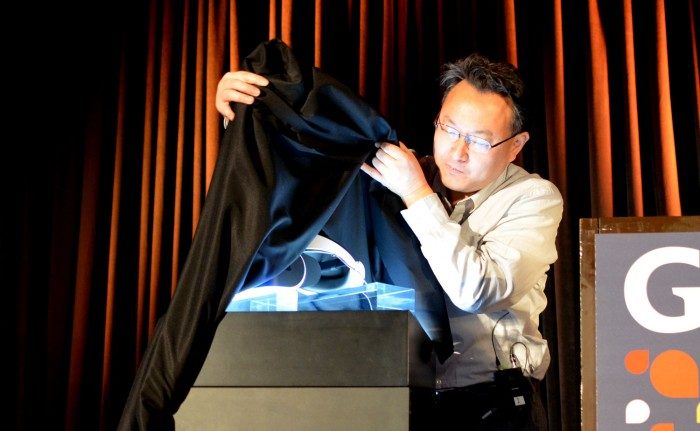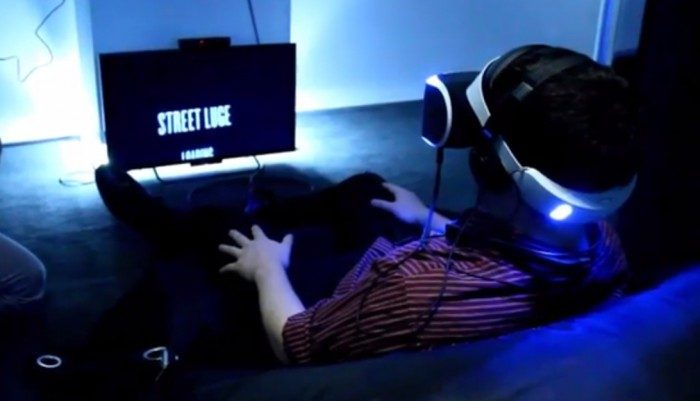SWVR‘s inaugural UK event in February attracted a great selection of industry talent to talk on their experiences developing for VR. One such talk was given by Sony London Studios’ Director Dave Ranyard, whose team is working heavily with the Playstation VR headset Project Morpheus. Their aim, to try and find out what works and what doesn’t in this brave new entertainment platform. Road to VR’s Jon Tustain sat down with Ranyard after his talk to find out a little more.
Sony unveiled their bold virtual reality gamble to the world back at GDC in March 2014. Their virtual reality headset, developed for the Playstation 4 platform, had been rumoured for months and yet its appearance caused quite a stir.

Since then, the company have had great presence at Vr industry and gaming shows, and have been very open in sharing and demonstrating their progress in both hardware and software.
Sony’s London Studios are heavily focused on researching what does and doesn’t work in this virtual reality, a platform that is as yet a wild west for developer brave enough to produce content for. As they’ve learned, they’ve shared via various talks and discussions since GDC 2014 the pitfalls and perils of VR development.
As Director of Sony’s London Studio’s, Dave Ranyard is tasked with guiding the team on that road of discovery, and he shared some of his thoughts on that process with Road to VR’s correspondent Jonathan Tustain whilst at SWVR.
On their prototype technical demo Street Luge, which was first demo’d at E3 2014 and involves the player wearing a Morpheus headset and lying prone on a beanbag, Ranyard elaborated on his studio’s experiments with comfort in virtual reality. “A traditional game it’s like looking at a window on the world, so if you’re driving a car you can spin off and do all kinds of crazt things. Doing things like that in VR, because it’s so close to what it would be like really is a bit uncomfortable”. So the team found that displaying the intersection of player without the discomfort of a jarring crash worked well. Instead of a harsh collision, they implemented a time penalty, keeping the feeling of jeopardy in place but removing the discomfort.

On more passive VR experiences, Ranyard says that although the team are interested in finding deeper experiences with a narrative (basic or otherwise) attached, passive and accessible experiences are important too. “We’ve done prototypes of things like Fireworks … it’s quite cool flying around fireworks, or even just looking up at them .. and working with music visualisers, all these different things”. Simple, passive experiences are by definition more accessible to “The more complex your core [gaming] mechanic, you’re not going to appeal to every single person in the world – you’ll appeal to more gamers. The less complex your mechanics, so a passive experience where you’re just enjoying something, anyone can get involved in that.”
Ranyard uses his mother, who has tried Morpheus Tech Demo ‘The Deep’, where the player is dropped into a shark tank under the sea, as a key example of this accessibility. “We had my mum doing The Deep, the shark demo, because she could just passively enjoy it – although it wasn’t too passive in the end as she was eaten by a shark.”
Finally, on London Studios’ remit and work to date, Ranyard highlights their focus thus far “Really our task if you like, is to find the [VR] experiences that have great value. So we’ve done lots of different prototypes, and then when we find something that’s really interesting we’ll get the artists involved and begin making it presentable.”
Ranyard’s talk “Virtual Reality: A New World to Explore” at SWVR can be found below.
Sony announced at GDC 2015 that the Morpheus’ consumer VR headset is due to ship in Q1 2016, as well as demonstrating their latest prototype at the show.
Our thanks to Dave Ranyard for sparing his time and to Jon Tustain for conducting the interview.






